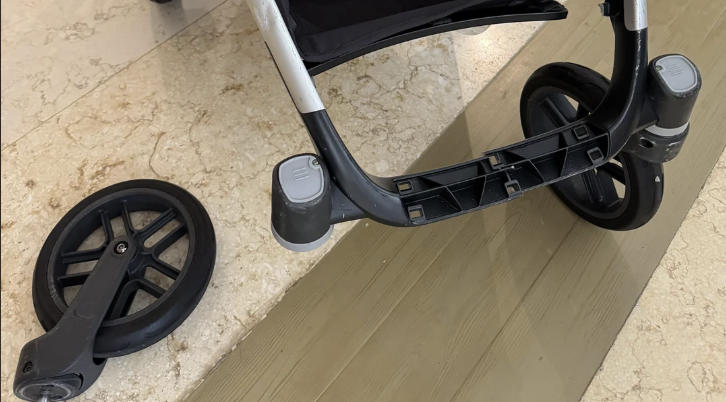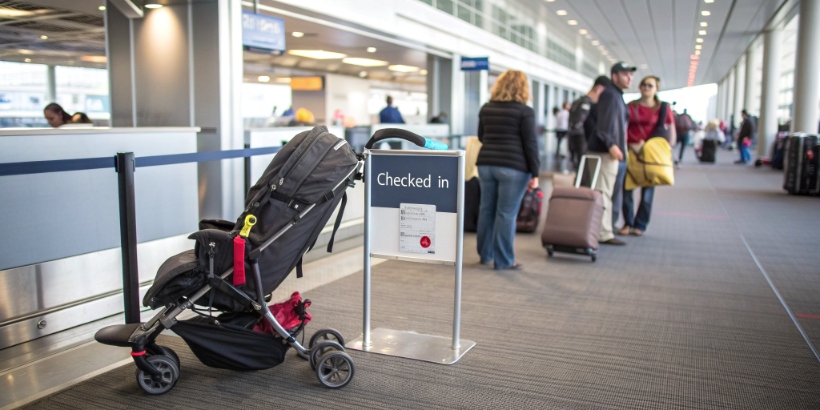Choosing a stroller is tough, especially with wheel sizes. Do bigger wheels mean a better ride, or just more bulk? Let us explore wheel sizes to find your perfect match.
Bigger stroller wheels generally offer a smoother ride and better maneuverability over uneven terrain like cobblestones, gravel, or grass, absorbing shocks more effectively. However, they can add weight and bulk, making compact folding harder. Smaller wheels are ideal for city, flat surfaces, and easier portability.
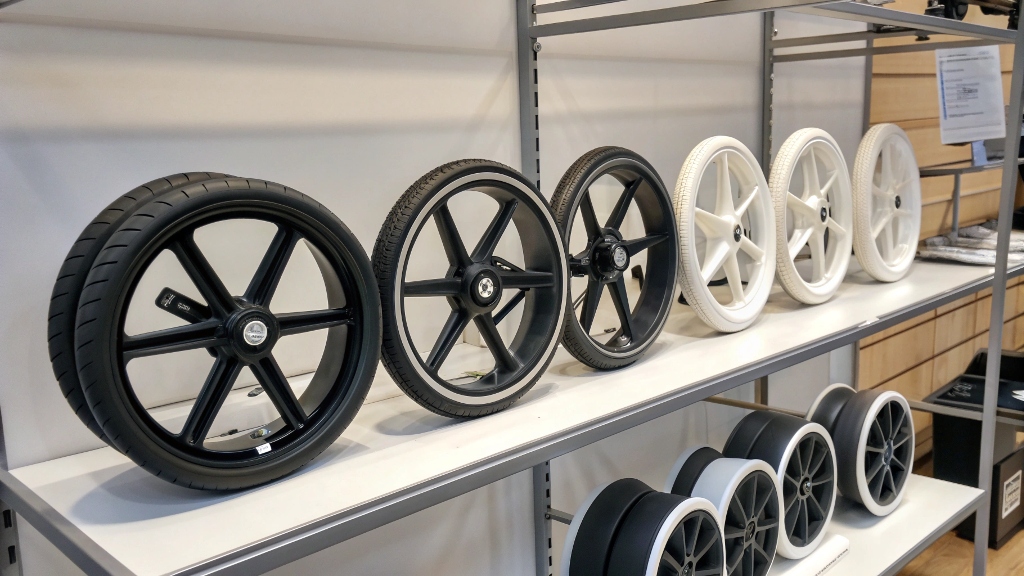
I remember pushing my first stroller. The small wheels struggled on anything but smooth pavement. It made me wonder, does wheel size truly matter? I quickly learned it makes a huge difference. I found myself lifting the stroller over small curbs. I dragged it through patches of grass in the park. My baby was often jostled. These experiences taught me that choosing the right wheels is not just about looks. It is about how you move through the world with your child. The wrong wheels can make an outing stressful. The right ones can make it enjoyable. Let us dive into what you need to know about stroller wheels. We will explore the different sizes. We will also see how each type performs. This will help you find the perfect match for your family’s adventures.
What Sizes of Stroller Wheels Are Available?
Stroller wheels come in many sizes. Are you confused by all the numbers? Understanding the options is the first step to a smoother ride.
Stroller wheels typically range from 4 inches for compact models to 16+ inches for jogging strollers. Common sizes include 6-8 inches for urban use, 10-12 inches for all-terrain, and larger for specialized activities, each designed for different terrains and purposes.
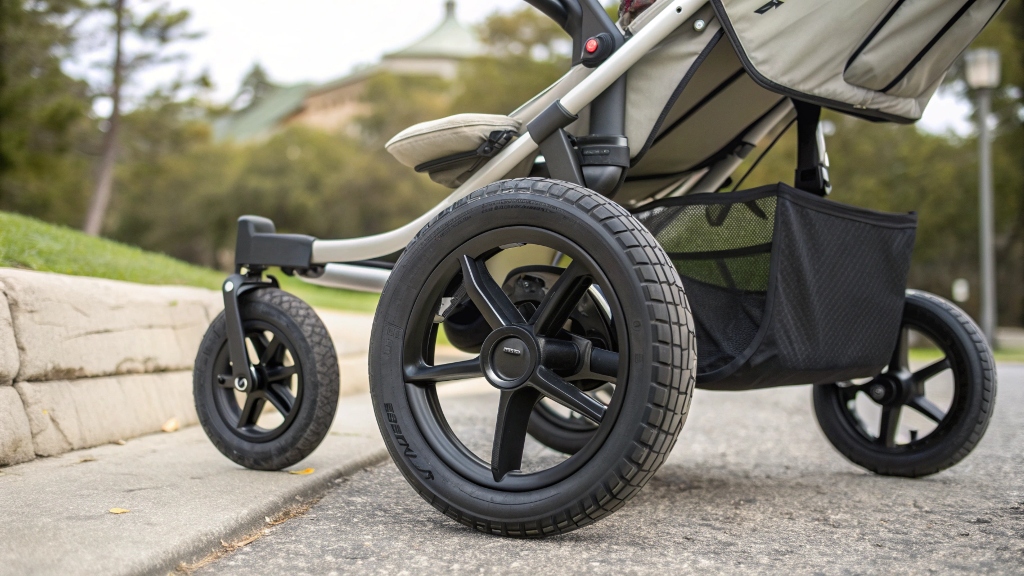
I have pushed many strollers, from tiny travel ones to big jogging types. The size of the wheels really dictates where you can go comfortably. Small wheels, often 4 to 6 inches, are great for lightweight, umbrella strollers. They work well on smooth airport floors or city sidewalks. They make the stroller very compact when folded. My suggestion is that, I often take my two children on long trips. I use a foldable stroller. For this type of stroller, sometimes I prioritize a mid-size wheel, about 7-8 inches. This gives a balance. It is still compact enough. But it handles slight bumps better than very small wheels. Mid-size wheels, from 7 to 10 inches, are common on everyday strollers. They offer good maneuverability. They can handle a mix of paved paths and light gravel. Larger wheels, typically 12 to 16 inches or more, are found on jogging or all-terrain strollers. They are designed to absorb shock. They roll easily over rough surfaces like grass, dirt trails, or uneven sidewalks. This provides a much smoother ride for the child and easier pushing for the parent. The material of the wheels also matters. Solid plastic wheels are cheap but less absorbent. Air-filled tires offer the best suspension but can get flat.
Common Stroller Wheel Sizes and Uses
Understanding common wheel sizes helps match them to your daily activities. Very small wheels (4-6 inches) are perfect for very light use and tight spaces. They turn sharply and are often found on travel or umbrella strollers, ideal for smooth, indoor environments. Mid-size wheels (7-10 inches) are the most versatile. They work for most daily urban and suburban needs, offering a balance between maneuverability and handling light bumps. They are common on standard everyday strollers. Larger wheels (11-16+ inches) are for more demanding environments. They give the most comfort on rougher ground and are characteristic of jogging or all-terrain strollers, built for stability and shock absorption over varied landscapes. I always think about where I will push the stroller most often. This helps decide the right size for my family’s adventures.
Wheel Material Matters
Beyond size, the material of the wheel influences its performance. Foam-filled tires, often made of EVA or similar compounds, offer a good balance. They are puncture-proof and provide better shock absorption than solid plastic. They require no maintenance. Air-filled rubber tires, similar to those on bicycles, give the best ride. They absorb the most bumps and provide superior suspension, making them ideal for rough terrain and active use. But they can get flat and require occasional pumping. Solid plastic wheels are light and cheap. But they offer little shock absorption. They are best for perfectly smooth surfaces and are often found on the most basic or lightweight models. Each material has trade-offs in terms of weight, durability, and comfort.
| Wheel Size Range | Typical Stroller Type | Best Use Case | My Experience/Insight |
|---|---|---|---|
| 4-6 inches | Umbrella, Travel | Smooth surfaces, airports, city sidewalks | Very compact, but struggles with any bumps or gravel |
| 7-10 inches | Everyday, Compact fold | Mixed urban, suburban, light park paths | Good balance of maneuverability and comfort for daily use |
| 11-16+ inches | Jogging, All-terrain, Hybrid | Rough roads, trails, grass, running | Best for active parents, very smooth over tough terrain |
What’s the Most Suitable Wheel Size for a Stroller?
So many wheel sizes exist. How do you pick the one that is truly right for you? Finding the best fit for your family is simpler than you think.
The most suitable stroller wheel size depends on your lifestyle: compact 4-6 inch wheels for city use and travel, 7-10 inches for versatile everyday urban/suburban use, and large 11-16+ inch wheels for active parents or rough terrain. Match the wheel size to your primary activities for optimal performance.
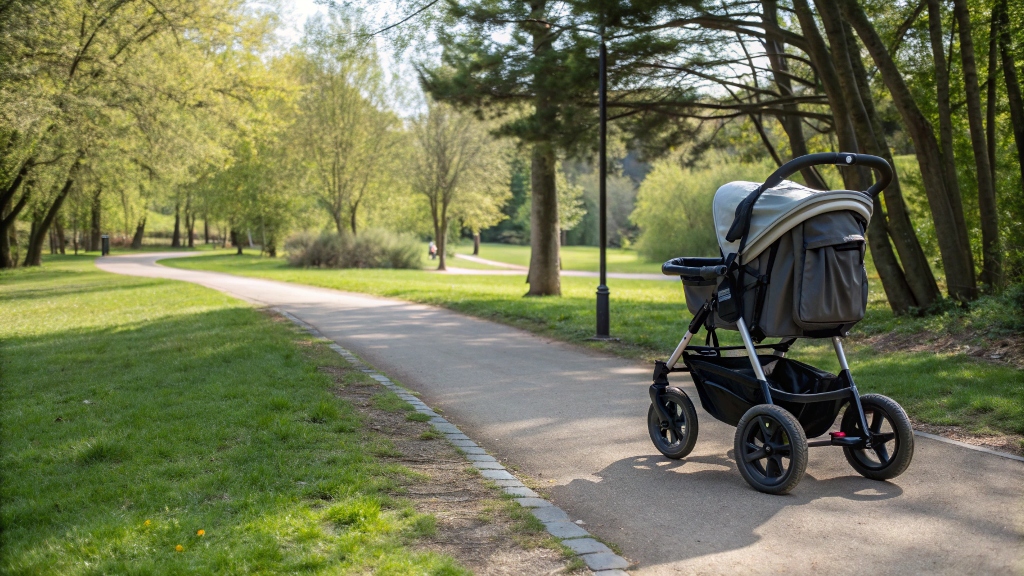
Choosing the most suitable wheel size really comes down to where and how you plan to use your stroller. I live in a city, but I also love taking my kids to parks with uneven paths. This meant I needed a stroller that could handle both. If you mostly stick to flat sidewalks, shopping malls, or indoor spaces, smaller wheels (4-8 inches) are perfect. They are lighter. They make the stroller easier to maneuver in tight spaces. They also allow for a more compact fold, which is great for small car trunks or public transport. My suggestion is that, I often take my two children on long trips. I use a foldable stroller. This means I need wheels that are durable enough for various surfaces but not too bulky when folded. For me, mid-sized wheels (around 7-10 inches) often hit the sweet spot. They offer a good balance of shock absorption and portability. If you are an active parent, you plan to jog, or you frequently traverse rough terrain like gravel paths, hiking trails, or even snow, then larger wheels (11-16+ inches) are a must. These wheels provide superior shock absorption. They give a much smoother ride for your child. They also make pushing much easier over challenging surfaces. The key is to think about your typical day.
Matching Wheels to Your Lifestyle
Your daily routine should guide your wheel size choice. City dwellers who rely on public transport or navigate tight spaces will value compact, smaller wheels. They fold easily and fit through narrow doorways, offering unmatched agility in crowded environments. Suburban families who do a mix of errands, park visits, and neighborhood walks might prefer mid-sized wheels. These offer versatility, handling both smooth pavements and slightly uneven park paths without trouble. Active families or those living in rural areas will benefit most from large, robust wheels. These handle rough conditions with ease, providing stability and comfort over grass, gravel, or dirt roads. Think about how often you will be lifting the stroller into a car or carrying it upstairs. Bigger wheels mean more weight, which can impact portability.
Considering Suspension and Maneuverability
Wheel size often ties into a stroller’s suspension system. Larger wheels, especially air-filled ones, naturally provide better suspension. They absorb bumps and vibrations more effectively before they reach your baby, making for a significantly more comfortable ride on rougher surfaces. Smaller wheels offer less natural suspension. If you choose smaller wheels, look for strollers with good built-in suspension in the frame or seat. This helps compensate for the lack of natural shock absorption. Maneuverability is also key. Swivel front wheels on any size make turning easy and are crucial for navigating tight corners or crowded stores. Lockable swivel wheels are great for jogging or navigating rough patches. They keep the stroller tracking straight and stable when needed.
| Lifestyle/Use Case | Recommended Wheel Size | Key Benefits | Considerations |
|---|---|---|---|
| Urban/City (smooth) | 4-8 inches | Compact, lightweight, easy to maneuver | Struggles with bumps, less natural shock absorption |
| Suburban/Mixed | 7-10 inches | Versatile, good balance of features | May not excel on very rough terrain, but good for most use cases |
| Active/All-Terrain | 11-16+ inches | Superior shock absorption, smooth ride | Heavier, bulkier, less compact fold; often fixed front wheels |
| Frequent Travel | 4-6 inches (or 7-8 for good fold) | Lightweight, compact, fits overhead bins | Limited to very smooth surfaces during travel; less durable |
| Jogging/Running | 12-16+ inches (fixed front) | Maximum stability, shock absorption | Not ideal for tight turns, usually a dedicated stroller; can be heavy |
Conclusion
Choosing the right stroller wheel size depends on your family’s daily life. Match the wheel size to your common terrain and activities for a smooth, comfortable ride every time.


